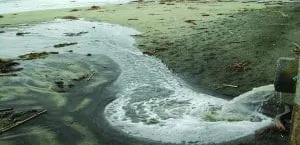

For years, Wisconsin landfills have relied on compliance with the storm water (stormwater) management requirements in the Chapter NR 500 code series to achieve compliance with the NR 216 storm water standards. Effective June 15, 2016, the Wisconsin Department of Natural Resources (WDNR) changed their policy, and now requires landfills and associated non-commercial borrow sites to obtain separate industrial storm water permit coverage.
Read the SCS Engineers Technical Bulletin to determine what action you may be required to take and by what date.
If you have questions or need help filing or developing a plan, please contact:
Betsy Powers, PE
(608) 216-7347
Sherren Clark, PE, PG
(608) 216-7323
Recent direct communications with SWRCB and local Regional Boards’ have indicated that during the 2016-2017 permit cycle year, inspections will be more detailed for facilities considered to be at high risk, which were specifically named as those with a long history of water quality violations, as well as scrap metal recyclers, and End-of-Life Vehicle (ELV) recycling. There will also be increased focus on facilities that discharge to impaired waterbodies with adopted Total Maximum Daily Load (TMDL) requirements.
Industries should take action now if there is any uncertainty in regards to the meeting permit regulations. Contact your local SCS Engineers’ office or one of our industrial stormwater experts in California, Cory Jones or Jonathan Meronek. If you need questions answered, or if you are unsure of your business’s requirements, and believe that your facility may be in violation, SCS will help sort through the permitting red-tape. This includes SMARTs filing, NOI/NEC or NONA submittals, SWPPPs and Monitoring and Implementation Plans.
Recent News, Stats, and Resources
More Resources
It’s not just that we like wine and happen to live and work in every wine producing region of the U.S.; SCS Engineers understands the need for clean water resources and how important they are to the wine industry and for agriculture in general. SCS helps wineries face an array of environmental and regulatory challenges including:
SCS is pleased to announce we are the newest member of WIN, the Wine Industry Network.

SCS Engineers offers sustainable environmental solutions to businesses with environmental challenges. SCS provides these services to private and public sector clients through a network of nationwide offices. For more information about SCS, please visit our website at www.scsengineers.com, or contact us at .
This workshop was insightful, tightly constructed, and – most impressive – able to deliver high quality information that businesses can use immediately. I have been to hundreds of business workshops where companies feel drowned in the amount of expert information coming at them. Not so at this concise, one-hour workshop where businesses clearly understood the next steps they should take and where they can find resources to help them proceed.
Jo Marie Diamond, President and CEO, East County Economic Development Authority after attending the SCS seminar in San Diego, CA. on March 1, 2016.
SCS Engineers staff professionals are available to answer questions about compliance and the proposed fee schedule changes for attendees and any business unsure about the storm water permit. We can help clarify questions such as:
See the slide presentation here if you have not attended the seminars.
If you have questions about how the storm water permit could impact your business, or would like to know more about the permit fees, please contact Cory Jones, your nearest SCS office in California, or .
Cory Jones, P.E., ToR, QSIP, is a stormwater program manager at SCS Engineers. Jones manages complex projects for private and public clients that include site/civil, water/wastewater and stormwater engineering. He has completed a wide variety of special studies in storm water management and National Pollutant Discharge Elimination System (NPDES) compliance for federal, state and municipal public agencies.

Current rates are flat fees where permittees pay approximately $1,800 for a permit whether you have one acre of industrial operations or 100. The proposed rates would consider criteria such as total acres of activity exposed to storm water, permeability, and percent of property used for industrial operations. If you would like to comment directly to the Water Board, email your suggestions to
A panel of experts will convene on Tuesday, March 1, 2016, from 7:30 a.m. to 9:15 a.m. at the Civic Building #8P-Presentation Hall to provide businesses with information necessary to determine if they need to comply or are exempt. The building is located at 10601 Magnolia Avenue in Santee, CA.
Register with Amy Snyder at 1-619-464-1200 or via email at
The session is free and will cover these topics:
Panel of Experts:
Bill Fischbeck, Esq., and the moderator is an attorney in East San Diego County since 1976, Bill’s practice is concentrated in real estate, including transactions and dispute analysis as well as land use matters before public agencies throughout the County.
Cory Jones, P.E., ToR, is a storm water program manager at SCS Engineers. Jones manages complex projects for private and public clients that include site/civil, water/wastewater and storm water engineering. He has completed a wide variety of special studies in storm water management and National Pollutant Discharge Elimination System (NPDES) compliance for federal, state and municipal public agencies.
An Environmental Attorney will also join the panel. The educational session is sponsored by Commercial Properties Group and the San Diego East County Economic Development Council.
Link to more information about storm water management
The Industrial General Permit is an NPDES permit that regulates discharges of stormwater associated with industrial activity. Based on the projected revenue and the predicted surplus, SWRCB is working to refine program funding and plans to adjust the current IGP permit fee structure.
Glen Osterhage, Fee Branch Manager for the California State Water Resources Control Board (SWRCB), Division of Administrative Services, met with industry leaders on November 3, 2015, to discuss potential changes to the stormwater Industrial General Permit (IGP) fee structure. Meeting attendees included: SCS Engineers, the Industrial Environmental Association (IEA), California Stormwater Quality Association (CASQA), the California Taxpayers Association (CTA), California Chamber of Commerce, the Independent Energy Producers Association (IEPA), and the host – California Manufacturing and Technology Association (CMTA).
The SWRCB funds eight core permit programs through the Waste Discharge Permit Fund, which pays for over 800 staff. California has cut allocations for agency staff funding by approximately $30 million dollars, forcing SWRBC to distribute its cost burden across the permit fee base. Currently, IGP permit fee revenue is $14.4 million (a single permit fee of $1,791 multiplied by approximately 8,035 permittees). However, SWRCB projects higher revenues due to increased enrollment when all newly required permittees file. Core programs are also subsidized with excess funds coming from the Construction Permit fees (excess of $2M over required $2M last year). Based on the current projected revenue and the predicted surplus the SWRCB is working to refine the IGP program funding and plans to adjust the structure of the permit fee from a flat rate to a rate adjusted for facility size, project complexity, and the threat to water quality.
Following the 2017 to 2018 year permit periods, the SWRCB will have better estimates with which they can accurately adjust fees. The SWRCB is exploring the potential for providing fee discounts for benefits or subsidizing other permit compliance cost burdens. For now, the No Exposure Certification (NEC) IGP Permits are likely to remain a flat fee, but their value may change following additional baseline permit data results.
The SWRCB’s revenue goal is, as always, to break-even; any proposed change to the fee structure is not intended to boost agency revenue over expenses. Another goal is to have data readily available for selecting a permit fee tier from the information submitted on the IGP’s online database application (Storm Water Multiple Application & Report Tracking System, SMARTS, smarts.waterboards.ca.gov).
The SWRCB will have additional meetings to collect comments on the proposed change in hopes of creating a consensus with permittees on these impending changes.
SCS Engineers will provide information as it becomes available. Our professionals are available to assist newly required permittees with filing and compliance requirements.
Contact SCS’s Stormwater Manager, Cory Jones at 1-858-571-5500 or .
Stormwater Management Services
The Regional Water Quality Control Board will be extending the storm water deadline from the previous effective date of December 24, 2015, an extra 90 days to approximately March 22, 2016.
Questions? Contact Dan Johnson at SCS Engineers or click below for more information.
http://www.waterboards.ca.gov/sandiego/water_issues/programs/stormwater/rsd_stormwater.shtml